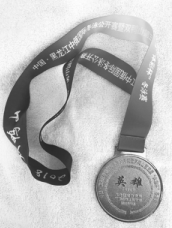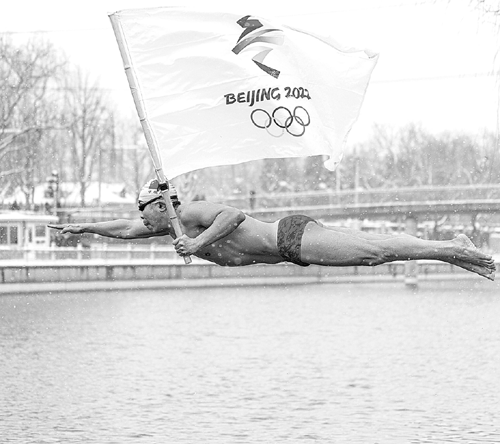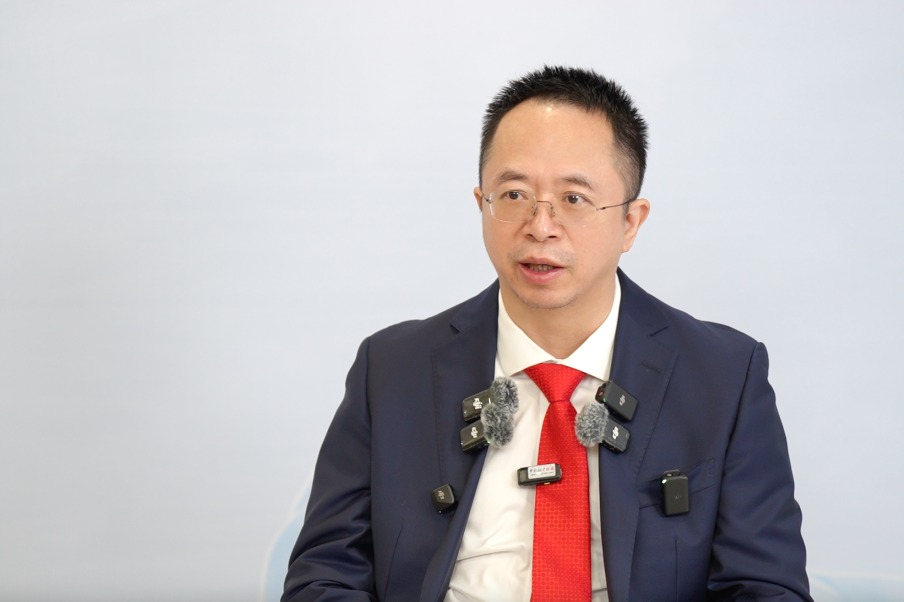Exploits of the ice man
For many swimmers the activity can bring cooling relief in the warmest months. For another breed, cool or cold water is not so much a relief as a challenge.

Xing Yuesheng jumps into the ice-cold waters of South Moat, breaking the calm of Longtan Lake Park in the Xicheng district of Beijing. It is Feb 13, and the swimming fanatic is holding the flag of the 24th Beijing Winter Olympics, intent on making a splash as he expresses his joy that the Games are unfolding successfully.
The first time Xing made a mark on river ice was in Yuyuantan Park in the Haidian district of the capital in January 2009. He was inspired by a classmate who had occasionally gone winter swimming on a whim, and the pair started to take a cold indoor bath every morning. They continue to do so and reckon that in all those years they have never suffered a cold.
In 2014 Xing heard about the growing popularity of winter swimming competitions and in November that year took part in the 21st Qiandao Lake National Winter Swimming Championship in Hangzhou, Zhejiang province, finishing 18th in the 100-meter breaststroke. He then began formal swimming training, and with growing confidence he took up regular winter swimming in 2017.
When the natatorium he frequented closed for repairs that year, he and other swimmers joked that they might need to resort to Bayi Lake in Yuyuantan Park to satiate their swimming desires. Xing, a dry-as-they-come Beijinger prone to cutting to the chase, took the suggestion seriously and was soon using the lake as his venue of choice for swimming in winter. Having once worked as an economist for the Beijing Railway Bureau he was fortunate to be able to travel free of charge, and within a year he was taking part in all kinds of competitions across the country.
"I am the only winter swimmer who has pulled out all the stops for all sorts of competitions among my peers," he says proudly.
His shortest competition was 25 meters in the sea, and the longest 13,500 meters in Meishan Bay in Ningbo, Zhejiang province. In 2017, he won fourth place in the Hong Kong Open Water Winter Swimming Championship, his southernmost competing site. In 2018, he traveled to China's northernmost ice swimming training base in Jiagedaqi district, Greater Khingan Mountains, and came fourth in the 50-meter breaststroke in an invitational competition with the air temperature close to -30 C.
He also competed in the plateau international swimming championships in Delingha, Qinghai province, at an average altitude of 2,980 meters. He has won several gold medals. His coldest challenge was in December 2018 when he took part in the Sino-Russian International Winter Swimming Open in Shuangya Mountain, Heilongjiang province. At the age of 59 years and 11 months he qualified to compete in the 1,000-meter event in water of 0.2 C. The air temperature was-21 C and he finished the race in 23 minutes, being awarded a Hero Medal, his top award to that point.
"The National Winter Swimming Championship is the ultimate in the country, and there's some really top-notch competition," Xing says. "I've won two silver medals in that."
He is particularly good in outdoor winter swimming and open water swimming competitions, he says, and has won long-distance open water national swimming championships many times.
"Since I was a kid I've loved physical training. I did martial arts at elementary school, and then wrestling. I'm very fit because in addition to swimming I go to the park every morning to do strength training, parallel bars, hand stands and yoga."
What sets Xing apart from most of the others who engage in his sport is that he is a year all-rounder. Many seniors look up to him, he inspires them in their endeavors, and he is a figurehead of winter swimming in Beijing.
The Beijing Winter Swimming Club has 23 winter swimming teams and about 1,200 registered members. The Beijing Water Authority supports eight winter swimming sites in Beijing, Longtan Lake Moat, being one of them.
"In need of a creative boost, I dived into the water with the flag of the Winter Olympics this time to support the Winter Games, carry forward the Olympic spirit, and respond to the call of 300 million people to take part in ice and snow sports," Xing says. "I also wanted to show the beauty and healthiness of winter swimmers, expressing our joy."
Winter swimmers lining up next to the freezing South Moat has become a part of the landscape in Beijing. Some do not even bother donning swimming gear, and it is not uncommon to see octogenarians prancing about without the protection of a towel as they warm up.
At this time of the year the water temperature is often about 2 C, and Xing usually swims 400 to 500 meters for eight to 11 minutes. When he is not doing this he may be somewhere practicing Chinese calligraphy or playing chess. Before the pandemic, he participated in about 10 games a year.
Winter swimming started to appear as a group activity in Beijing in the 1950s. At that time, with the vigorous promotion of the Municipal Sports Committee, mass physical exercises began to emerge in the city in winter. Pre-work gymnastics, inter-work gymnastics, long-distance running, soccer and basketball, cross-country running, table tennis, rope skipping, gymnastics and ice sports were among them, and Beijing was soon organizing winter swimming citywide.
In the 1960s the number of winter swimming enthusiasts in Beijing increased, producing mass winter swimming organizations. In January 1970, one day after heavy snowfall, Beijing's earliest winter swimming team, the Bayi Lake Winter Swimming Team, was established on the east bank of Bayi Lake.
On Jan 14, 1979, Beijing held its first-ever winter swimming performance to the warm applause of more than 3,000 spectators. The north bank of Bayi Lake bustled as the 74 winter swimmers in the event prepared. They took off their thin coats and drank water. At 1 pm the performance started and the athletes took to the five swimming lanes. Some swam freestyle, some breaststroke and others butterfly. Their ability to endure the cold, icy water that day won them many admirers.
At the 10th Winter Swimming Performance Competition in 1988, tens of thousands of spectators, a record turnout, cheered on the shore and 1,505 winter swimmers who chanted "exercise and revitalize China" managed to swim at least 100 meters. At the time schools in Beijing were offering elective courses and lectures on winter swimming. Even at the Longtan Spring Festival Temple Fair, an event popular with Beijingers, a winter swimming pool was set up.
Entering the 21st century, Beijing's bid for the Summer Olympics inspired Beijing's winter swimmers to showcase their tenacity. From November 2000 to March 2001 the athlete Zhang Jian insisted on winter swimming training in the ice water of the swimming pool at Tsinghua University, Jinhai Lake and Longqingxia Reservoir to increase his resistance to the cold. At 1:26 am on July 30, 2001, the day the country celebrated its success in being awarded the 2008 Olympics, Zhang became the first Chinese to cross the Channel between England and France after powering his way through the waves for nearly 12 hours.
The twin destinies of winter swimming and the Olympics were renewed when Beijing bid for the Winter Olympics, being awarded them in 2015. Meng Zhaocheng, former chairman of the Beijing Winter Swimming Club, called for winter swimming to be promoted as part of the Games, either in competition or as part of the opening ceremony.
In Yuyuantan Park a woman takes out a speaker and invites a partner to dance with her after their daily swim. With the dance over, they pose for photographs, and another man picks up an electric guitar and begins to play My Motherland and Me.
For many of the swimmers at such events, the cold is the last thing on their mind; the joy of old memories is sufficient to warm the day.




Today's Top News
- China and EU should strive for dynamic equilibrium through shared development: China Daily editorial
- Xi extends condolences to Putin over plane crash in Russia
- What's behind Nvidia's charm offensive?
- Xi urges China and EU to strengthen bilateral relationship for a brighter future
- China's basic medical insurance covers 95% of population
- Summit seen as opportunity to strengthen ties






























